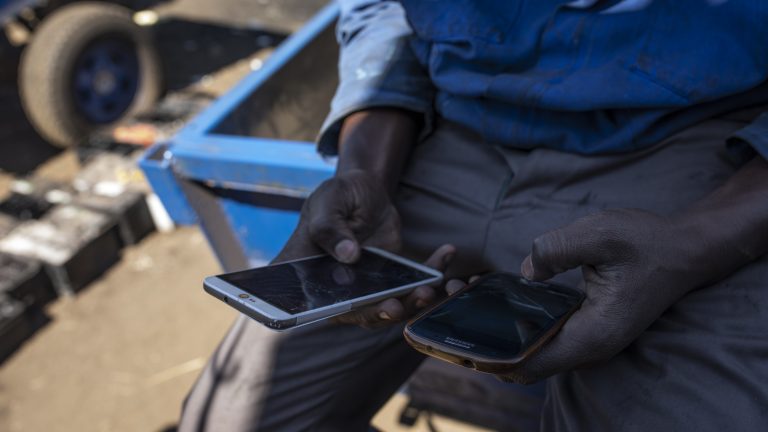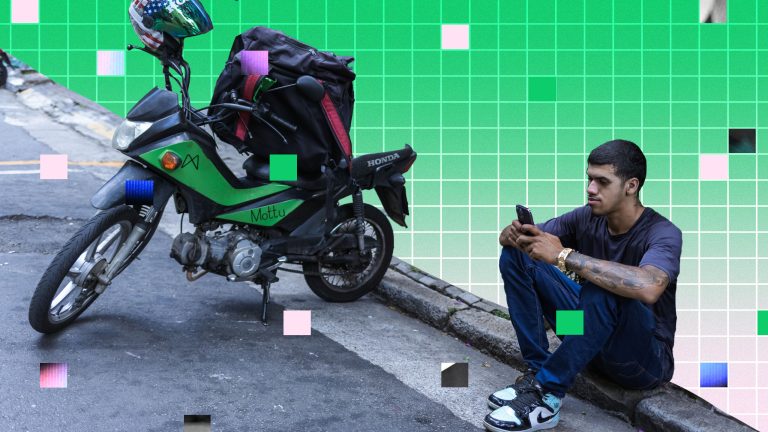Never Mtisi works as a courier at Kurwaisimba, a retail business center in Chimanimani in eastern Zimbabwe, ferrying merchandise between cities. Inflation in Zimbabwe means that wholesale prices often change quickly, and Mtisi relies on traders’ groups on WhatsApp to keep track as well as to take orders. But the price of internet access has also spiraled, making it expensive to stay online. In February, NetOne, Zimbabwe’s second-largest telecomms company, hiked data prices by more than 600%, although it swiftly reversed the decision after public outcry. “It’s costly. It’s insane, the price of data in Zimbabwe,” Mtisi told Rest of World. “It’s as if Zimbabwe doesn’t want her citizens to go online.”
According to the Alliance for Affordable Internet, an internet-access advocacy nonprofit, Zimbabwe is one of the costliest places in Africa to access mobile internet, relative to people’s average income. On Econet, the country’s largest telecomm, 1.4GB of data retails for 2,000 Zimbabwean dollars ($15), which is more than twice AAI’s benchmark of 2% of average monthly income. Outside of big cities like Harare and Bulawayo, 4G LTE signal strength is often weak.
Mtisi, like many people in border towns like Chimanimani, relies on a black market trade in SIM cards from neighboring Mozambique, where 2GB of data can cost as little as 200 meticais ($3) from Movitel, Mozambique’s largest mobile network. Everyone from NGO workers and nurses to high school students and the unemployed all surf the web at better prices and better speeds, thanks to the errant internet signals that bounce across the hilly, forested border. The availability of cheaper data has even turned Chimanimani into an unlikely remote working hub.
“Movitel Mozambique SIM cards are selling briskly, like bread,” Levy Manjeni, a kiosk owner in the center of Chimanimani, told Rest of World. “Most shoppers ignore our Zimbabwe Econet and NetOne SIM cards,” he said.
Econet and NetOne had a combined 94.5% market share at the end of 2020, according to the national telecomms regulator. Analysts say that the lack of competition, combined with the high cost of running a telecomms business in Zimbabwe — due to import tariffs on communications equipment, foreign currency risk, and weak infrastructure — has kept prices high for consumers. “Poor collateral infrastructure, like electricity, dissuades telecomms investment and [means] fewer players, which leads to higher costs,” Arthur Gwagwa, a leading Zimbabwe telecomms expert and lawyer, told Rest of World.
The cripplingly high cost of internet access has slowed adoption of digital services by individuals and businesses and prevented Zimbabweans from accessing educational materials and health services online, Gwagwa said.
“Movitel Mozambique sim cards are selling briskly, like bread.”
But for people living near the border with Mozambique, there is a workaround. Enterprising traders cross over on foot or on motorbikes, bulk-buy Movitel SIM cards, and return to Chimanimani, where they distribute the SIMs to supermarkets and corner shops, where they are sold with a markup of more than 50%.
The availability of affordable internet has made the unfashionable rural district into an attractive destination for people who need to be online for work. The area was hit by a tropical cyclone in 2019, which displaced more than 11,000 people in Chimanimani alone, bringing hundreds of NGO and health workers to the area to work on the relief. Many have stayed, taking advantage of the cheap internet access to work remotely.
They include Luke Doda, an environmentalist working for Environmental Buddies, a charity based in Harare that promotes sustainable forests and waste management across Zimbabwe, especially in places like Chimanimani where cyclones damage ecosystems. “Via Zoom, WhatsApp, Skype from Movitel Mozambique’s broadband signals, I’m able to do daily e-meetings of how my work is unrolling here in Chimanimani,” Doda, who came to the area in August 2019, told Rest of World. “My managers too can digitally audit my tree planting tasks via Google Meet video.”
Nollen Singo, founder of NGO Orphans Dreams, which gives free math lessons to children orphaned by the cyclone, said that he’s been able to stay in the region because the cheap internet allows him to connect to free education apps that can be used in the classroom. “It’s so helpful being able to access Khan Academy maths app or Buzzmath app online and tutor local orphaned kids,” Singo said.
Some entrepreneurs have moved to the town just to take advantage of the lower cost of getting online. Tatenda Moyo, a former nurse, moved to Chimanimani in May 2019 from Harare to set up a Chinese medicine business. “The first thing I did on arrival in Chimanimani from Harare was to dump our Zimbabwe Econet SIM card and fetch a Movitel Mozambique SIM card,” Moyo told Rest of World. “I need super-speed internet to communicate fast via Zoom or WhatsApp with a medical doctor 500 kilometers away in Harare before giving out prescription dosages of herbs.”
Anesu Sithole, a bookkeeper, came back to Chimanimani from the capital in 2020, looking for lower costs and a more affordable small-town lifestyle. She said there’s plenty of demand from locals filing their e-taxes and car-import customs preparations from local entrepreneurs. “I won’t return to the city because here I can file tax reports digitally, and work is plentiful,” she told Rest of World.
Chimanimani’s cheap foreign broadband access has allowed the border town to — temporarily at least — escape the fate of other rural districts in Zimbabwe and across Africa, where young workers, including those in vital roles, drift away to the cities in search of opportunities.
“It means in rural places like Chimanimani, where the cost of living is quite cheap, we can have specialist nurses, midwives motivated by cheap LTE broadband stay and serve the needy,” said O’Brien Nhachi, a social scientist.



